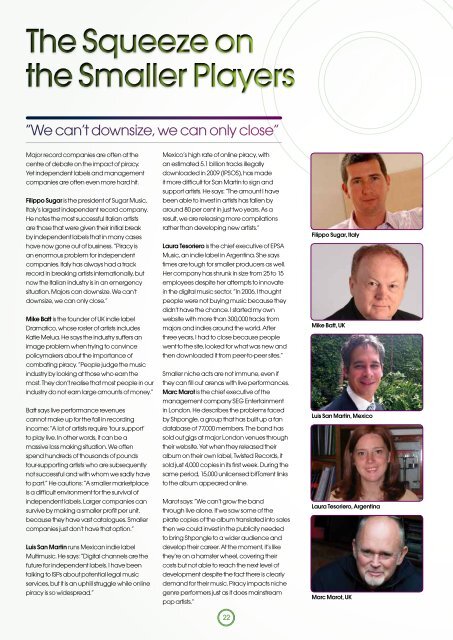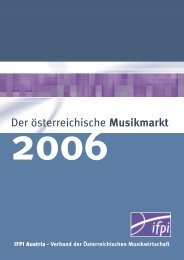IFPI Digital Music Report 2011
IFPI Digital Music Report 2011
IFPI Digital Music Report 2011
You also want an ePaper? Increase the reach of your titles
YUMPU automatically turns print PDFs into web optimized ePapers that Google loves.
The Squeeze on<br />
the Smaller Players<br />
“We can’t downsize, we can only close”<br />
Major record companies are often at the<br />
centre of debate on the impact of piracy.<br />
Yet independent labels and management<br />
companies are often even more hard hit.<br />
Filippo Sugar is the president of Sugar <strong>Music</strong>,<br />
Italy’s largest independent record company.<br />
He notes the most successful Italian artists<br />
are those that were given their initial break<br />
by independent labels that in many cases<br />
have now gone out of business. “Piracy is<br />
an enormous problem for independent<br />
companies. Italy has always had a track<br />
record in breaking artists internationally, but<br />
now the Italian industry is in an emergency<br />
situation. Majors can downsize. We can’t<br />
downsize, we can only close.”<br />
Mike Batt is the founder of UK indie label<br />
Dramatico, whose roster of artists includes<br />
Katie Melua. He says the industry suffers an<br />
image problem when trying to convince<br />
policymakers about the importance of<br />
combating piracy. “People judge the music<br />
industry by looking at those who earn the<br />
most. They don’t realise that most people in our<br />
industry do not earn large amounts of money.”<br />
Batt says live performance revenues<br />
cannot make up for the fall in recording<br />
income: “A lot of artists require ‘tour support’<br />
to play live. In other words, it can be a<br />
massive loss making situation. We often<br />
spend hundreds of thousands of pounds<br />
tour-supporting artists who are subsequently<br />
not successful and with whom we sadly have<br />
to part.” He cautions: “A smaller marketplace<br />
is a difficult environment for the survival of<br />
independent labels. Larger companies can<br />
survive by making a smaller profit per unit,<br />
because they have vast catalogues. Smaller<br />
companies just don’t have that option.”<br />
Luis San Martin runs Mexican indie label<br />
Multimusic. He says: “<strong>Digital</strong> channels are the<br />
future for independent labels. I have been<br />
talking to ISPs about potential legal music<br />
services, but it is an uphill struggle while online<br />
piracy is so widespread.”<br />
Mexico’s high rate of online piracy, with<br />
an estimated 5.1 billion tracks illegally<br />
downloaded in 2009 (IPSOS), has made<br />
it more difficult for San Martin to sign and<br />
support artists. He says: “The amount I have<br />
been able to invest in artists has fallen by<br />
around 80 per cent in just two years. As a<br />
result, we are releasing more compilations<br />
rather than developing new artists.”<br />
Laura Tesoriero is the chief executive of EPSA<br />
<strong>Music</strong>, an indie label in Argentina. She says<br />
times are tough for smaller producers as well.<br />
Her company has shrunk in size from 25 to 15<br />
employees despite her attempts to innovate<br />
in the digital music sector. “In 2006, I thought<br />
people were not buying music because they<br />
didn’t have the chance. I started my own<br />
website with more than 300,000 tracks from<br />
majors and indies around the world. After<br />
three years, I had to close because people<br />
went to the site, looked for what was new and<br />
then downloaded it from peer-to-peer sites.”<br />
Smaller niche acts are not immune, even if<br />
they can fill out arenas with live performances.<br />
Marc Marot is the chief executive of the<br />
management company SEG Entertainment<br />
in London. He describes the problems faced<br />
by Shpongle, a group that has built up a fan<br />
database of 77,000 members. The band has<br />
sold out gigs at major London venues through<br />
their website. Yet when they released their<br />
album on their own label, Twisted Records, it<br />
sold just 4,000 copies in its first week. During the<br />
same period, 15,000 unlicensed bitTorrent links<br />
to the album appeared online.<br />
Marot says: “We can’t grow the band<br />
through live alone. If we saw some of the<br />
pirate copies of the album translated into sales<br />
then we could invest in the publicity needed<br />
to bring Shpongle to a wider audience and<br />
develop their career. At the moment, it’s like<br />
they’re on a hamster wheel, covering their<br />
costs but not able to reach the next level of<br />
development despite the fact there is clearly<br />
demand for their music. Piracy impacts niche<br />
genre performers just as it does mainstream<br />
pop artists.”<br />
22<br />
Filippo Sugar, Italy<br />
Mike Batt, UK<br />
Luis San Martin, Mexico<br />
Laura Tesoriero, Argentina<br />
Marc Marot, UK



